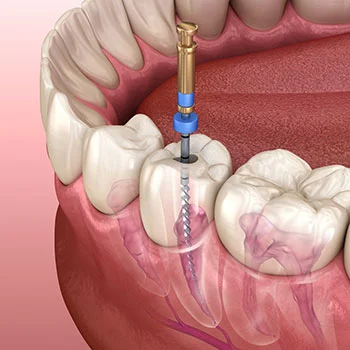Even when you are vigilant in your oral care habits, you may have a tooth infection. If not addressed early, the infection can get into the tooth pulp. When this happens, the tooth will need to be extracted or treated with root canal therapy. Most dentists, especially those at Palisades Dental Care, will always strive to salvage the structure of the natural tooth when possible- extraction is the last option.
The most common procedure used when the infection has reached the tooth pulp is root canal therapy. Many people believe that root canal treatment is painful, so they avoid it if at all possible. In the past, this procedure was on the more painful end of the dental treatment spectrum. However, with advancements in dental technology and pain relief, root canal treatment is no more painful than a standard dental filling.
How Does a Root Canal Work?
Root canal treatment involves removing the soft center, or pulp, of the tooth. This is where the nerves and blood vessels are. Once the pulp is removed, the tooth loses its nourishment and begins to die, which is why a crown is typically used to protect the tooth’s structure.
The dentist will drill a small hole in the tooth to remove the pulp. Then, the inside of the tooth will be disinfected to kill the bacteria left behind. After disinfecting, the tooth will be filled with gutta-percha, which is a biocompatible material that will support the tooth. The hole is then sealed with a dental filling. In some cases, this is all that is required. In other cases, a crown may also be used to further protect the tooth.
Do I Need a Root Canal?
 There are several indicators that you may need root canal treatment, including:
There are several indicators that you may need root canal treatment, including:
-
Severe Sensitivity
Sensitivity may manifest as a sharp pain or a dull ache and usually occurs after eating or drinking something that is extremely hot or cold. This is an indication that the nerves and blood vessels inside the tooth are damaged or infected. -
Swelling Around Teeth
Another common sign of infection in the tooth is gum swelling near the affected tooth due to pus collecting. Sometimes, the pus may not drain, which can cause the swelling to spread to the jaw, face, and neck. If untreated, it can ultimately spread to the brain or other areas and be life-threatening. -
Persisting Chronic Toothaches
One of the most common signs that you may need root canal treatment is persistent tooth pain. The pain may be constant or intermittent and is often felt deep in the tooth. In some cases, you may feel referred pain in other teeth or your jaw or face. However, tooth pain may have other causes as well:- Tooth decay
- Gum disease
- Impacted/infected tooth
- Referred pain from another issue such as a sinus infection
- Damaged dental filling
-
Abscesses
A dental abscess is an indication that an infection is present. It appears as a pimple- or boil-like spot on the gum near the affected tooth. If it breaks open, you may have a foul taste in your mouth. Root canal treatment removes the infection, which resolves the abscess. -
Untreated decay
Tooth decay will not resolve on its own. If left untreated, it will only get worse and spread to the rest of the tooth and possibly neighboring teeth. You can reduce your risk of untreated decay by visiting the dentist every 6 months for an exam and cleaning. This will allow decay to be detected and treated early. -
Discoloration (darkening)
While tooth discoloration may be due to a variety of things, many times it is due to an infection of the tooth pulp. Discoloration occurs because the infection destroys the pulp, creating an inadequate blood supply. This causes the tooth to appear grayish-black. -
Past trauma to the tooth
If you’ve experienced trauma to the face or mouth and were not checked by your dentist, it’s important to schedule an evaluation. In some cases, there may be damage that is not readily visible but can be seen with a comprehensive exam including X-rays. If you have teeth that are damaged, they need to be restored before infection can get to the pulp. -
Large crack
If you have a large crack in your tooth, the pulp is at an increased risk of infection because bacteria can get inside of it. If you have a large crack, it’s important to visit the dentist and have it checked. If caught early, we can repair the damage to reduce the risk that you will need root canal treatment in the future.
How long does a root canal take?
The time required for root canal therapy depends on the location of the tooth. It is possible to complete the process in one visit, but sometimes two are required. On average, you can expect to spend anywhere from 90 minutes to 3 hours in the dental chair.
- Canines/Incisors: 45 minutes to 1 hour
- Premolars: 1 hour or more, depending on the complexity of the tooth
- Molars: 90 minutes or more, depending on the complexity of the tooth
If the crown is made in-house, you can expect to add an hour to your treatment time. If the crown is fabricated in an off-site dental lab, you’ll need to have a second appointment.
Are root canals more painful than fillings?
Pain tolerance varies from one patient to another. However, on average, root canal treatment is no more painful than a dental filling. Local anesthesia is used to numb the area, so you should not feel any pain during treatment. You may have some mild discomfort as the anesthesia wears off, therefore, you will want to take a pain reliever before that happens.
You may also have some soreness due to having your mouth open for a longer period of time.
How do I know if I need a root canal?
The only way to confirm that you need root canal treatment is with a visit to the dentist. If you are experiencing any of the above symptoms, schedule your consultation with the team at Palisades Dental Care Dumont, NJ today. We can help you determine the best treatment for your tooth.
We are located on East Madison Ave in Dumont. Our office hours are
- Monday: 9 AM to 6 PM
- Tuesday: 8 AM to 6 PM
- Wednesday: 12 AM to 6 PM
- Thursday: 11 AM to 7 PM
- Friday: 8 AM to 2 PM
- Saturday: By Appointment Only
Root Canal Treatment FAQs
How much is a root canal?
The cost of root canal treatment ranges from about $1,000 to $1,600. There are several factors involved in determining the cost:
- Location of the tooth
- Professional performing the procedure Professional performing the procedure (general dentist or endodontist)
- First-time treatment or re-treatment
- Emergency or scheduled
- Insurance coverage
- Your location/the location of the clinic
- Whether you need a crown or filling
Front teeth are the easiest, so they are the least expensive. On average, front teeth cost around $1,000, while bicuspids cost around $1,100. Molars are harder to access so they typically range from around $1,300 to $1,600. If the procedure is a re-treatment, you can expect to pay up to 20% more.


